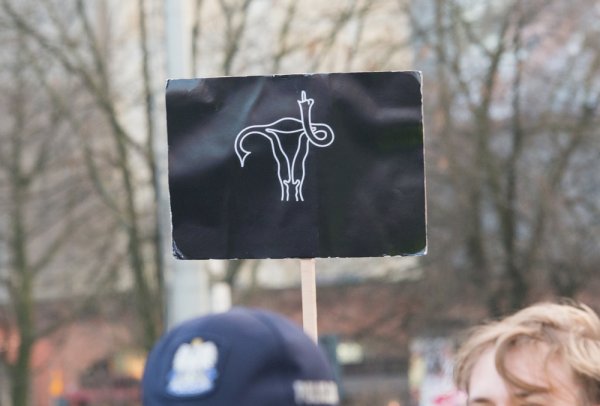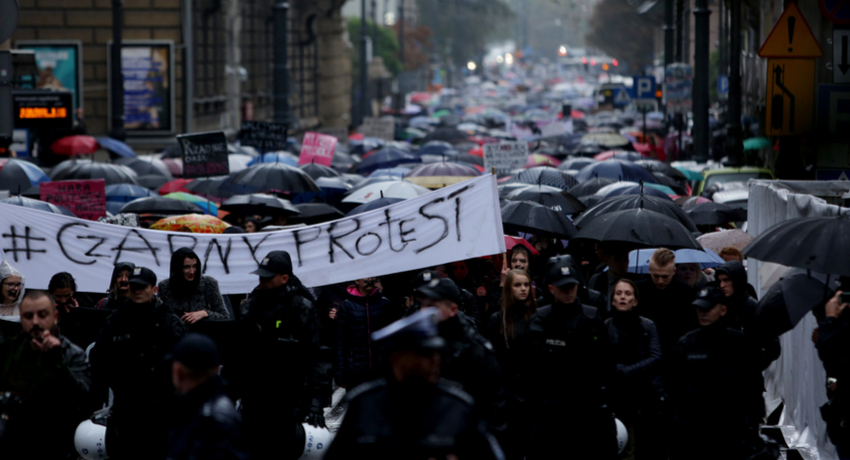In April 2016, when the Episcopal Conference published an open letter to the Polish Parliament (Sejm), urging the MPs to “increase the protection of unborn life,” pro-choice activists launched a Facebook group called Dziewuchy Dziewuchom – Girls for Girls. The aim of the group was to coordinate nationwide protests against the passage of the new abortion law.
While the protesters did not achieve their goal at that time and the bill proceeded in the Parliament, they managed to demonstrate their determination and gain significant public support. Within days of launching, the activist page had over 100,000 followers.
When the bill was debated by the Sejm in September 2016, Dziewuchy called for nationwide protests. A small progressive political party called Razem launched a viral social media campaign called #CzarnyProtest (#BlackProtest) where the opponents of the new legislation posted pictures of themselves wearing black.
The Black Monday became a show of solidarity and public activism. For thousands of women who participated, it was their first political demonstration
The public mobilisation against the bill led to the landmark Polish Women’s Strike in October 2016, when an estimated 100,000 protesters showed up at rallies held in many towns and cities throughout the country. The Black Monday became a show of solidarity and public activism. For thousands of women who participated, it was their first political demonstration.
The astounding thing about the Black Protest was both the speed at which it was organised, and its reach – demonstrations were held in more than 60 towns and cities throughout Poland. In large cities like Warsaw and Krakow, thousands marched.
Notably, social media also showed images of much smaller demonstrations: groups of women wearing black with home-made signs, meeting together to protest in the main squares of their towns. Doing this outside big cities, in communities where Catholicism is still very much the norm, required a great deal of civil courage.

The Black Protest was a true “No Pasarán” moment. The scale of popular opposition, especially in smaller towns, the mainstay of Poland’s ruling party, Law and Justice (PiS), made the party backtrack with surprising speed. Three days after the protest, the Sejm voted the bill down, with many of the MPs experiencing a sudden change of heart.
Since then, PiS politicians have made repeated attempts to tighten the abortion law, trying to proceed revised and slightly less harsh versions of the rejected bill, always backtracking at the last moment in the face of popular opposition. The last attempt was in April 2018. Confronted with a second, massive Black Protest on 23 March, PiS suddenly changed the agenda of the Sejm, cancelling the debate on the bill.
In the face of such strong and widespread opposition, taking the abortion law and other anti-women legislation off the agenda should have been common sense. But the decisions of PiS appeared to be motivated by ideology rather than logic.
The party’s goals in the sphere of reproductive and sexual rights are only palatable to the hardliners in the Episcopal Conference, and to small groups of religious fundamentalists. But apart from the total ban on abortion, PiS continues to float a range of ideas whose common denominator is the need to control people’s sexual and reproductive choices: making certain kinds of contraception illegal, cancelling public funding of IVF treatment, and changing the sex education curriculum so that it conforms to Catholic doctrine.
…the future looks grim: polls show that PiS is poised to win the next general election in 2019
It seems scarcely believable in a European country in 2018, but PiS seems determined to subjugate women in the name of religious fundamentalism. And yet, whenever their attempts are checked by widespread protests, they backtrack, bide their time and try to do it again – by hook or by crook. It appears that their need to control women’s sexuality goes beyond ideological motivations and amounts to an obsession.
So far, women in Poland have won several battles, but they haven’t yet won the war. In spite of the growing public support for the protests and their energy, the future looks grim: polls show that PiS is poised to win the next general election in 2019.

Leader of ruling party Law and Justice, Kaczynski, right, and Polish Prime Minister Szydlo attend a press conference summarizing two years of the party’s government, November 2017
PiS exerts total control over public television and radio, and uses their full potential to marginalize and destroy its political opponents. As such, the public media channels are outlets for blatant propaganda, branding Black Protesters and women’s rights activists as “enemies of the people.”
In this struggle, the most powerful weapons that Polish women have are solidarity and connectedness. Social media helps to level the playing field
In this struggle, the most powerful weapons that Polish women have are solidarity and connectedness. Social media, in particular, helps to level the playing field. Thanks to Facebook and Twitter, the voices of women, marginalised in the Parliament and the mainstream media, can be heard in the public debate.
Another hopeful sign is international solidarity: Polish Women’s Strike is part of the International Women’s Strike network, and solidarity protests were staged in many countries on the day of the Black Protest in 2016 and 2018. We can still hope that women in Poland will be able to block PiS’s future attempts to limit their freedom, but it is worrying that they have to do it using extra-parliamentary means. The parliamentary opposition is not as involved in the protests as it could be, and has tried in the past to hijack them for their own political ends.
It is also disheartening that PiS’s behaviour is a mixture of short-term cowardice – they backtrack after every large-scale women’s protest, and long-term relentlessness – after a period of respite, they try to do it again.
In the words of a famous slogan: I can’t believe we still have to protest this shit, again and again.




